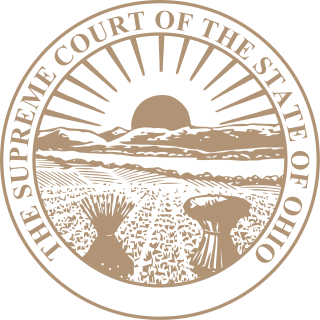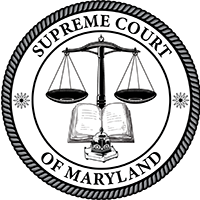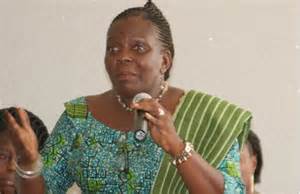
The Politics of Liberia takes place in a framework of a presidential representative democratic republic modeled on the government of the United States, whereby the president is the head of state and head of government; unlike the United States, however, Liberia is a unitary state as opposed to a federation and has a pluriform multi-party system rather than the two-party system that characterizes US politics. Executive power is exercised by the government. Legislative power is vested in both the government and the two chambers of the legislature.

The Supreme Court of the State of Ohio is the highest court in the U.S. state of Ohio, with final authority over interpretations of Ohio law and the Ohio Constitution. The court has seven members, a chief justice and six associate justices, who are elected at large by the voters of Ohio for six-year terms. The court has a total of 1,550 other employees. Since 2004, the court has met in the Thomas J. Moyer Ohio Judicial Center on the east bank of the Scioto River in Downtown Columbus. Prior to 2004, the court met in the James A. Rhodes State Office Tower and earlier in the Judiciary Annex of the Ohio Statehouse.

The Supreme Court of Maryland is the highest court of the U.S. state of Maryland. The court, which is composed of one chief justice and six associate justices, meets in the Robert C. Murphy Courts of Appeal Building in the state capital, Annapolis. The term of the Court begins the second Monday of September. The Court is unique among American courts in that the justices wear red robes.

The Supreme Court of Florida is the highest court in the U.S. state of Florida. It consists of seven justices—one of whom serves as Chief Justice. Six members are chosen from six districts around the state to foster geographic diversity, and one is selected at large.

The Legislature of Liberia is the bicameral legislature of the government of Liberia. It consists of a Senate – the upper house, and a House of Representatives – the lower house, modeled after the United States Congress. Sessions are held at the Capitol Building in Monrovia. Legislature of Liberia is considered one of the three branches of government based on the Article III of the Constitution of Liberia that stipulates all three branches ought to be equal and coordinated based on the Principle of checks and balances.

The Supreme Court of Liberia is the highest judicial body in Liberia. The court consists of the Chief Justice of Liberia, who is also the top judiciary official, and four associate justices, who are nominated by the President and confirmed by the Senate. The justices hold court at the Temple of Justice on Capitol Hill in Monrovia.

The Montana Supreme Court is the highest court of the state court system in the U.S. state of Montana. It is established and its powers defined by Article VII of the 1972 Montana Constitution. It is primarily an appellate court which reviews civil and criminal decisions of Montana's trial courts of general jurisdiction and certain specialized legislative courts, only having original jurisdiction in a limited number of actions. The court's Chief Justice and six Associate Justices are elected by non-partisan, popular elections. The Montana Supreme Court meets in the Joseph P. Mazurek Building in Helena, Montana, the state's capital, an international style building completed in 1982 and named in the honor of former Montana Attorney General, Joseph P. Mazurek.

The New Mexico Supreme Court is the highest court in the U.S. state of New Mexico. It is established and its powers defined by Article VI of the New Mexico Constitution. It is primarily an appellate court which reviews civil and criminal decisions of New Mexico's trial courts of general jurisdiction and certain specialized legislative courts, only having original jurisdiction in a limited number of actions. It currently resides in the New Mexico Supreme Court Building in Santa Fe.

Johnnie N. Lewis was a Liberian lawyer and politician who served as the 18th Chief Justice of Liberia from 2006 to 2012. Before his appointment to the Supreme Court, he served as a circuit judge in Liberia's judicial system.

The Constitution of Liberia is the supreme law of the Republic of Liberia. The current constitution, which came into force on 6 January 1986, replaced the Liberian Constitution of 1847, which had been in force since the independence of Liberia. Much like the 1847 Constitution, the Constitution creates a system of government heavily modeled on the Federal Government of the United States.

General elections were held in Liberia on 11 October 2011, with a second round of the presidential election on 8 November. The presidency, as well as all seats in the House of Representatives and half of the seats in the Senate, were up for election. The election was overseen by the National Elections Commission (NEC).

The Liberian Constitution of 1847 was the first constitution of the Republic of Liberia. Largely modeled on the Constitution of the United States, it remained in effect from its adoption on 26 July 1847 until its suspension by the People's Redemption Council, following the coup d'état on 12 April 1980.

The chief justice of Liberia is the head of the judicial branch of the Government of the Republic of Liberia and the chief judge of the Supreme Court of Liberia.

A referendum to amend the Constitution of Liberia was held on 23 August 2011. Voters chose whether to ratify four amendments regarding judge tenure, elections scheduling, presidential candidate requirements and the electoral system. The National Elections Commission of Liberia (NEC) oversaw the referendum.

General elections were held in Liberia on 10 October 2017 to elect the President and House of Representatives. No candidate won a majority in the first round of the presidential vote, so the top two finishers – CDC standard-bearer Amb. George Weah and UP standard-bearer Vice President Joseph Boakai – competed in a run-off on 26 December. The second round was originally scheduled for 7 November, but was postponed after LP standard-bearer Cllr. Charles Brumskine, in third place, challenged the result in the Supreme Court. The Supreme Court dismissed the challenge, which would have forced a re-run of the first round had it been successful, and the second round was held on 26 December. Weah emerged victorious with 60% of the vote.

Gloria Maya Musu-Scott is a former Liberian politician and jurist who served as Chief Justice of the Supreme Court from 1997 until 2003. She and three other family members were convicted of murder in 2023 in connection with the death of her niece. Following an appeal, her and her family members were acquitted by the Supreme Court.

Sie-A-Nyene Gyapay Yuoh is a Liberian judge and politician who currently serves as chief justice of the Supreme Court of Liberia and was nominated on August 23, 2022. She began to serve after the retirement of former chief justice Francis Korkpor on September 27, 2022.

A constitutional referendum was held in Liberia on 8 December 2020 alongside Senate elections and two by-elections to the House of Representatives. It had been planned for 13 October, but was postponed due to the COVID-19 pandemic. Voters were asked whether they approved of eight amendments to the constitution, voting separately on each one. Although a majority of valid votes were in favour of each proposal, the two-thirds quorum was not met for any proposal.
Events in the year 2016 in Liberia.
Events in the year 2013 in Liberia.











